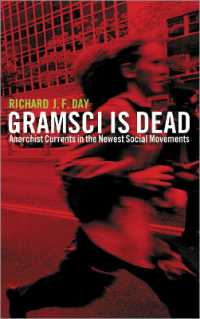- ホーム
- > 洋書
- > 英文書
- > Cinema / Film
Full Description
Rights advocacy has become a prominent facet of South Korea's increasingly transnational motion picture output, especially following the 1998 presidential inauguration of Kim Dae-jung, a former political prisoner and victim of human rights abuses who received the Nobel Peace Prize in 2000. Today it is not unusual to see a big-budget production about the pursuit of social justice or the protection of civil liberties contending for the top spot at the box office. With that cultural shift has come a diversification of film subjects, which range from undocumented workers' rights to the sexual harassment experienced by women to high-school bullying to the struggles among people with disabilities to gain inclusion within a society that has transformed significantly since winning democratic freedoms three decades ago. Combining in-depth textual analyses of films such as Bleak Night, Okja, Planet of Snail, Repatriation, and Silenced with broader historical contextualization, Movie Minorities offers the first English-language study of South Korean cinema's role in helping to galvanize activist social movements across several identity-based categories.
Contents
A Note on the Text
Introduction: "I Am a Human Being": The Question of Rights in South Korean Cinema
Part I Institutional Foundations and Formal Structures
1 The Rise of Rights-Advocacy Cinema in Postauthoritarian South Korea
2 If You Were Me: Transnational Crossings and South Korean Omnibus Films
Part II Movie Minors and Minor Cinemas
3 Hell Is Other High Schoolers: Bigots, Bullies, and Teenage "Villainy" in South Korean Cinema
4 Indie Filmmaking and Queer Advocacy: Converging Identities in Leesong Hee-il's Films and Writings
Part III Disability Rights in Mainstream and Minoritarian Filmmaking
5 Always, Blind, and Silenced: Disability Discourses in Contemporary South Korean Cinema
6 Barrier-Free Cinema: Caring for People with Disabilities and Touching the Other in Planet of Snail
Part IV Representing Prisoners of the North and South
7 Beyond Torture Epistephilia: The Ethics of Encounter and Separation in Kim Dong-won's Repatriation
8 Story as Freedom or Prison? Narrative Invention and Human Rights Interventions in Camp 14: Total Control Zone
Part V Migrant Worker Rights in Hybrid Documentaries
9 Between Scenery and Scenario: Landscape, Narrative, and Structured Absence in a Korean Migrant Workers Documentary
10 "Powers of the False" and "Real Fiction": Migrant Workers in The City of Cranes and Other Mockumentaries
Part VI Nonhuman Rights in a Posthuman World
11 Animal Rights Advocacy, Holocaustal Imagery, and Interspecies Empathy in An Omnivorous Family's Dilemma and Okja
Coda: "I Am (Not) a Human Being": The Question of Robot Rights in South Korean Cinema
Acknowledgments
Notes
Index








